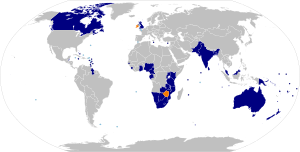 Image via Wikipedia
Image via WikipediaPeople in Commonwealth countries are being urged to support the call for a first-ever discussion about homosexuality at the Commonwealth leaders summit.
13 October, a large group of civil society organisations from throughout the 54-member state association have put forward a 'Statement of Action on the Decriminalisation of Adult Same Sex Conduct in the Commonwealth' for the Commonwealth Heads of Government Meeting (CHOGM) in Perth, Australia, 28 October.
The CHOGM leaders have never in their entire history even discussed – let alone supported – LGBT human rights. They have always refused to consider this humanitarian issue, despite the fact that more than 40 of the 54 Commonwealth member states continue to punish same-sex behaviour with criminal sanctions.
Over half the world's countries that criminalise homosexuality belong to the Commonwealth. Penalties include life imprisonment in Sierra Leone, Tanzania, Pakistan, Uganda, Bangladesh and Guyana. In some countries, including Nigeria, Cameroon and Uganda, homophobic witch-hunts take place.
The Statement says:
"The continued criminalisation of a minority for no other reason than their immutable characteristics is a form of discrimination and persecution that cannot continue amongst a community of nations that has committed itself to protecting human rights and equality before the law."Following an article in May in The Guardian newspaper, by human rights activist Peter Tatchell, which strongly criticised the Secretary General and the Commonwealth for their failure to speak out against homophobic and transphobic persecution in member countries, Kamalesh Sharma became the first Commonwealth Secretary General to make an explicit and unequivocal public statement criticising homophobia and homophobic discrimination.
Sharma claimed that work is going on 'behind the scenes'.
"This sometimes leads to a perception that we are inactive or silent on certain issues. This could not be further from the truth."Following further lobbying, at the Commonwealth Law Ministers Meeting in Sydney in July, Sharma reiterated that sexual orientation victimisation is incompatible with Commonwealth values.
However, obvious doubts remain about whether the Commonwealth will take any action. A year ago leaked document obtained by the Guardian showed that Commonwealth staff were told by the Secretary General it is not their job to speak out against human rights abuses
A protest march 28 October in Perth will include protests against the lack of LGBT human rights in many Commonwealth nations.
Meanwhile, a group of 'global south' LGBT activists are pleading to be let in to the Commonwealth People’s Space which takes place alongside CHOGM. This has been the only way that LGBT issues have previously seen the light at the event.
In 2007 in Kampala, Uganda, LGBT activists were humiliated and assaulted by state representatives and the public. Things changed in 2009 in Trinidad and Tobago when a breakthrough saw the Commonwealth People’s Forum (CPF) include LGBT issues in its Civil Society Statement.
However in Perth five LGBT activists from Africa, Asia, the Caribbean, and the Pacific Islands can't get in because 40% of the slots available have been reserved for Australians.
A protest letter from 15 'global south' LGBT groups says:
"Meaningful achievements on sexual citizenship and gender justice in the Commonwealth require the participation of members of civil society whose daily lives are at the core of those issues, the Commonwealth citizens whose humanity and sexuality the Commonwealth continues to allow its members to criminalise, and of representatives of the civil society organizations on the frontlines of work for change in these areas. Our inability to contribute to these initiatives at CPF 2011 (the hallmark of the Commonwealth’s commitment to civil society engagement), and to hold them accountable, will deprive efforts in this area by advocates and governments of critical legitimacy and credibility, and risk half-gains and missteps."If you are a Commonwealth citizen you can help with the request to Commonwealth leaders to put the decriminalisation of homosexuality, support for LGBT equality and action on HIV on the official CHOGM agenda for discussion by the heads of government of the 54 member states.
- Here is a sample letter, which you can copy or adapt.
- Email the Commonwealth Secretary General, Kamalesh Sharma: secretary-general@commonwealth.int
- Email the CHOGM host, the Australian Foreign Minister Kevin Rudd: Kevin.Rudd.MP@aph.gov.au and also email kevin.rudd@dfat.gov.au
- Sign this petition organised by a coalition of HIV organisations.
A spokeswoman for Rudd said he would raise the issue with foreign ministers from Commonwealth countries attending the meeting.
“Australia is a global advocate of non-discrimination on the basis of sexual orientation,” the spokeswoman said.
“Australia encourages all countries to decriminalise homosexuality by removing all laws imposing criminal penalties for homosexual conduct.
“Mr Rudd will be raising these matters with Commonwealth foreign ministers at CHOGM.”
Civil Society Statement of Action on the Decriminalisation of Adult Same Sex Conduct in the Commonwealth








 Join our page
Join our page


The CHOGM should not be held in Australia. It is totally inappropriate whilst they continue to turn a blind eye to their own human rights abuses: www.expendable.tv
ReplyDelete